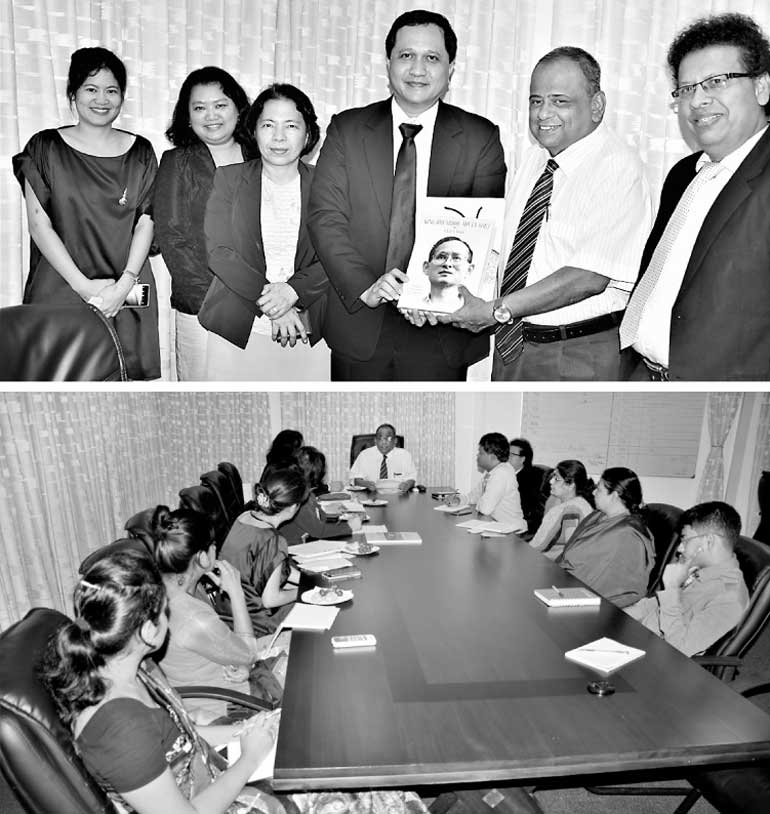Sunday Feb 22, 2026
Sunday Feb 22, 2026
Saturday, 17 March 2018 00:00 - - {{hitsCtrl.values.hits}}

The Thailand delegation headed by National Office for Conflict Resolution and Reconciliation Secretary-General Pol. Lt. Col. Phongthon Thanyasri, Embassy of Thailand Ambassador Chulamanee Chartsuwan, Embassy of Thailand First Secretary Chotika Attapimon and Ministry of Justice, Thailand Office of the Permanent Secretary Policy and Planning Analyst Nawarat Narkvichit visited the Ministry of National Integration and Reconciliation on 12 March, to get first-hand information on national integration and reconciliation processes in Sri Lanka.
The discussion with the delegation spelt out the structural overview of the Ministry of National Integration and Reconciliation and signified the importance given to the reconciliation agenda of Sri Lanka as it was headed by President Maithripala Sirisena in his capacity as the Minister.
The delegation was briefed on the establishment of the Office on Missing Persons (OMP) under the Act, No. 14 of 2016 to search and trace the whereabouts and the fate of the missing persons as a part of the transitional justice mechanism. OMP is an independent commission and it has been gazetted under the Ministry of National Integration and Reconciliation. The Commissioners of the OMP were recommended by the Constitutional Council and appointed by the President. A survey has been already launched to get comprehensive information on missing persons through ‘Feedback Datasheet Form’ from the family members of the missing persons which are certified by Grama Niladhari (GN), Divisional Secretariat, and District Secretariat administration.
Further, the delegation was briefed on the reconciliation strategies such as the Policy on National Reconciliation; National Reconciliation Action Plan (NRAP); declaration of national integration and reconciliation week; integration friendly schools program; integration friendly universities and youth program; integration friendly media program (peace journalism); establishment of District Reconciliation Committees (DRCs) to address religious and ethnic tensions; Reconciliation focused Economic Empowerment Project (REEP) to promote reconciliation through establishing business linkages between North and South; reconciliation focused 50,000 housing program for the conflict affected in the Northern and Eastern Provinces; high priority roads and bridges project; other interventions such as MyliddyHarbour development in the Northern Province; establishment of an economic centre in Jaffna linking Dambulla economy centre and other related programs including school development and improving of hospital development programs said Ministry of National Integration and Reconciliation Secretary V. Sivagnanasothy.

The briefing session also explained that the Sri Lankan reconciliation interventions as a benefactor covers all ethnic and social infrastructure development work focusing vulnerable groups such as Internally Displaced Persons (IDPs); refugee returnees; women-headed families; war affected disabled families; rehabilitated ex-combatants; families of the missing persons; and low-income poverty groups.
The Thailand delegation commended the logic of the Nation Reconciliation Action Plan (NRAP) and explained the Thailand interventions such as ‘National Harmony Board’ which focuses on negotiation based settlements to reduce overcrowding of courts and abridge the delays in justice processes.
The discussion was also centred on reconciliation being looked from different angles and perspectives by different stakeholders such as victims, perpetrators, local communities, Government, International communities, Diaspora, and national and international civil society organisations said Sivagnanasothy.
The Thailand delegation also interest in DRCs and demining with special emphasis on developing flexible artificial/prosthetics to augment impaired parts of the body for the war affected disabled. They also expounded that the mutual sharing and learning of experiences on reconciliation interventions will benefit both countries to formulate more result-oriented reconciliation interventions.
From the Ministry of National Integration and Reconciliation, Secretary V. Sivagnanasothy, State Secretary Sujan Nanayakkara, Additional Secretary, R.P.R. Amarasinghe, Assistant Director
Vaidehi Anushyanthan, Assistant Secretary Nikarilkanth, Policy Planning and Coordination Assistant Segar Dhanukshaan and other officers participated.